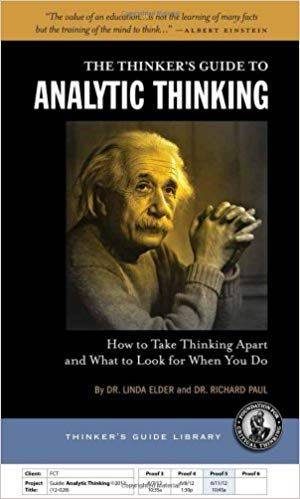
Download Thinker’s Guide to Analytic Thinking: How to Take Thinking Apart and What to Look for When You Do PDF EPUB
Author: Author
Pages: 56
Size: 3.406,70 Kb
Publication Date: January 1,2007
Category: Curricula
This guide targets the intellectual skills that enable someone to analyze anything one might consider - questions, problems, disciplines, subjects, etc. These abilities are needed in learning any significant body of content material in a nontrivial way. Why helpful information on Analytic Thinking? Evaluation and evaluation are named crucial abilities for all college students to master. To be able to develop the analytic brain, there must be assistance, instruction, and practice in monitoring considering using intellectual equipment applicable to every self-discipline. It offers the normal denominator between all types of analysis. For instance, one cannot believe analytically FOR NO PURPOSE. It really is these analytic equipment that enable someone to get at the many fundamental logic of any self-discipline, subject, problem, or concern. For instance, one cannot perform qualitative evaluation in chemistry without instruction in chemistry. What we’ve provided in this instruction, however, may be the common denominator between all types of evaluation because all forms need thoughtful app and all believed presupposes the components of thought. There are several varieties of analysis particular to particular disciplines and specialized procedures. Or think analytically, without QUESTION at heart. And once and for all reason. Everyone must learn to question reasons, goals, problem definitions, info, concepts, etc. It really is these interdisciplinary analytic equipment that enable those competent in them to comprehend and assess their analytic considering, whether in an extremely technical area or within an everyday personal app. These types of analysis frequently require specialized training of a specific nature. They offer the opportinity for transfer of learning between and among topics and disciplines. They enable motivated people to gain a synopsis of their learning in virtually any and every scenario analyzed, to believe their method into and out of varied intellectual domains. This thinker’s guide acts as a launching pad toward analytic proficiency.